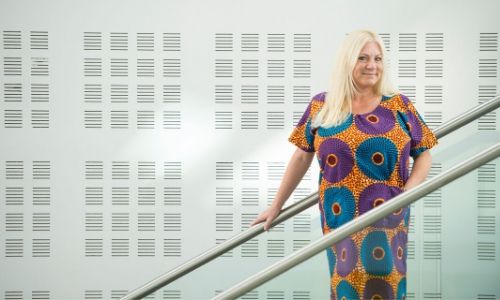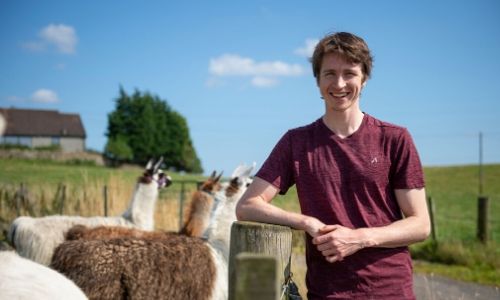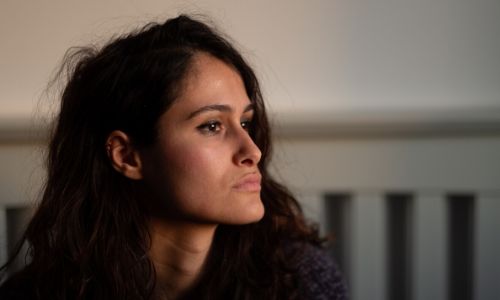Throughout the year the University asks students to think creatively and expansively about how their studies can enable them to make a socially responsible impact on the world. Students are invited to apply for a grant to help make their ambitions possible.
Funding for these grants is generously provided by alumni and supporters like you.

Nicola McLeod
Nicola (aka Nicky) was a second year BN Nursing (Learning Disabilities) student when she travelled to Ghana.
Nicky had a non-traditional journey into higher education. Her life had been full of challenges but somehow her resilience and determination saw her through. She had never been away anywhere on her own, yet she found herself at the point where her two children were old enough to look after themselves and her studies were making her curious about how learning disabilities are treated outside the UK.
As well as being awarded a mobility grant, Nicky organised bake sales and fundraisers to enable her to travel to Ghana. She spent three weeks there, splitting her time between a hospital and a residential school for children with learning disabilities. She witnessed a different approach to practice, but what stood out to her the most was the difference in cultural attitudes toward people with learning disabilities. She hadn't been prepared for how stigmatised the children were because of their disabilities, and she learned about the work being done to try to change this cultural misunderstanding from the leaders of the school.
Nicky was then invited to speak in front of 500 people, including the Archbishop and the Chief of Takoradi, an opportunity which then led to her meeting and speaking with the President of Ghana. She spoke to all of them about her growing knowledge and research into learning disabilities through her course in Edinburgh. She advocated for the leaders of Ghana to prioritise public education to help shift the cultural stigmatisation of people with learning disabilities.
Nicky's work in the school didn't end when she travelled home. She has continued raising money for the students, sending care packages and advocating for change on their behalf.

Lewis White
Lewis was a third year BEng (Hons) Energy & Environmental Engineering student when he travelled to Peru.
Before Lewis began his studies at Edinburgh Napier he developed a relationship with The WindAid Institute, and NGO that delivers projects that provide clean, reliable, wind-generated electricity to developing communities. In 2016, Lewis travelled to Peru to complete the construction and installation of a 2.5kW turbine system at a primary school in the village of Nuevo Manzanilla. The village sits in the mountainous Cajamarca region, which has one of the lowest electrification rates in Peru due to its topography and scattered population.
Lewis developed a connection to the project and the people the turbine was serving. When he came back to Edinburgh to progress his engineering studies, he kept up the relationships and interests he developed in Peru. He was awarded a mobility grant to help him with the costs of purchasing spare parts and materials and travelling back to Peru. This time he went to carry out maintenance on the turbine he had previously installed.
In addition to carrying out maintenance on the turbine, Lewis also focused on the community and in particular the teachers at the school. He delivered training on the safety, battery care and the electrical system to teachers, enabling them to lead on more regular maintenance. While he was there he also laid some groundwork for the construction of a weather station and visited a potential new turbine installation site in the village of El Chorro.
The mobility grant has enabled Lewis to apply his studies, offer a service to a community and build global relationships. It is unlikely this will be his last trip to the Cajamarca region.

Cósima de los Arcos
Cósima was a fourth year BA (Hons) Film student when she made a socially impactful documentary about male suicide.
Statistics from Samaritans consistently indicate that over 70 per cent of suicides in Scotland are completed by men. Men between the ages of 45 and 54 have the highest rate overall and that number is increasing year on year.
These statistics shocked and saddened Cósima, motivating her to share the stories behind the numbers. She wanted to give men an opportunity to talk about suicide and mental health in their own words, and provide families with the chance to talk about the men they have lost.
Cósima received her mobility grant to assist with the costs of producing this film and travelling around Scotland collecting interviews. The resulting nine minute documentary film is a moving and often painful piece of storytelling. It raises awareness of those suffering from poor mental health and provides a platform for honest discussion. Perhaps most importantly, the subjects of the documentary talk about their hopes for the future, which was an aspect Cósima really wanted to focus on.
Cósima said: "I witnessed heart-breaking stories of people that have to live with depression and anxiety every day of their lives. I had conversations with families that have lost loved ones to suicide and think about this experience every day. I got to know those that have managed to use the pain of their loss and turn it into a means to help others. I have met people that have attempted suicide and now, years later, they know they want to keep living. Overall, this experience has been greatly inspiring and humbling."
For Cósima the reason behind making this film was to share the stories. In keeping with this desire, she budgeted a large portion of her grant for distributing the film. These stories will have the most impact when they are seen and heard by as many people as possible.